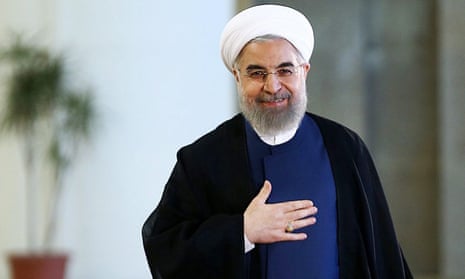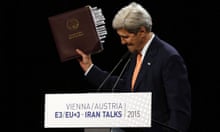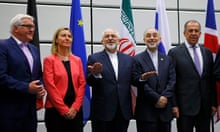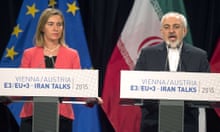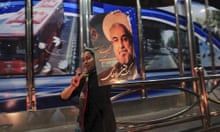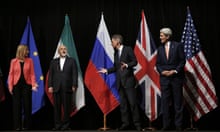The deal with Iran over its nuclear programme finalised in Vienna today is a victory for patient diplomacy. For the past 13 years, the standoff between Iran and the US, backed by its European allies, has threatened to escalate into war. In his 2002 state of the union address George W Bush lumped Iran in with North Korea and Iraq as part of the “axis of evil”, and he later heightened tensions further by increasing naval deployments to the Gulf. For more than a decade, Israel, with its own undeclared nuclear arsenal, has regularly warned that it was prepared to mount a pre-emptive air attack on Iranian nuclear facilities.
The strained relationship between Washington and Tehran did not begin with the 1979 Iranian revolution. But the storming of the US embassy and the taking of American hostages scarred US attitudes in the decades that followed. The prospect of conflict heightened in 1988 when the USS Vincennes shot down an Iranian passenger plane, killing 290. Tensions rose again in 2002, the genesis of the present crisis, when the Iranians were found to be withholding the truth about their nuclear programme, with the discovery of two previously undisclosed facilities at Natanz and Arak, giving rise to fears that Iran was hellbent on securing a nuclear weapon.
That recent history underlines the scale of what happened in Vienna. Instead of politicians opting for military solutions, this has been a triumph for diplomats and pragmatists, working hour after hour on the detail of a deal that secures a peaceful compromise – and which represents a heartening success in the global quest to halt nuclear proliferation. Credit goes to the tireless US secretary of state, John Kerry, but also to America’s partners: Germany, France and Britain, including the former European high representative on foreign affairs, Baroness Ashton, and, in spite of tensions over Ukraine, also to Russia, and, to a lesser extent, China. Credit, too, to the Iranian president Hassan Rouhani, who has had to face down suspicious hardliners at home.
The deal offers Iran a chance to come in from the cold in a new realignment with the west. That would be good for both the Iranian people and the west, offering a chance for greater engagement, whether through trade, investment and tourism or the negotiation of regional problems. President Rouhani will be strengthened in his battles with Iranian hardliners presiding over what remains a repressive regime. Now he should push for domestic reforms, ending the house arrests of opposition leaders and the charade of the trial of the Washington Post reporter Jason Rezaian.
There is now the possibility of Iran playing a different, more constructive role in the affairs of the Middle East, as well as with neighbours to the east such as Afghanistan. From its lethal support of Syrian president Bashar al-Assad to the destabilising impact on Lebanon of its arms supplies to Hezbollah, Iran has too often been a malign influence in the region. However, the rise of Islamic State has complicated the picture, with the US initially critical of Iran for interference in Iraq in support of the Shia community but with the two countries now working if not together then in tandem against Isis.
Tehran, which likes to boast of its constructive approach, should prove it by adopting a more emollient approach to Israel and using its influence to promote a peace agreement with the Palestinians. Israel’s prime minister, Binyamin Netanyahu, speaking ahead of the deal, described it as a mistake of historic proportions, arguing that it leaves Iran with the option of securing a nuclear weapon. But the detail agreed in Vienna suggests that would be difficult – and certainly much harder than it would have been had no agreement been reached. Among other concessions, Iran will reduce its enrichment capacity by two-thirds and stop using its underground facility at Fordow for enriching uranium. Iran has conceded on almost every key point. Its nuclear facilities will become among the most monitored in the world, under the intrusive eye of the International Atomic Energy Agency.
The US should grab this opportunity, moving as fast as is reasonable to ease sanctions, giving the long-suffering Iranian public tangible benefits. The danger is that a Republican-dominated Congress, still unforgiving of Iran and sympathetic to Mr Netanyahu, may seek to thwart the deal. President Barack Obama said he would use his veto, but Congress could override that with a two-thirds vote. That would be shortsighted. Mr Obama certainly needed a major foreign policy success to add to his domestic legacy, and this deal could be that prize. But the repercussions of the Vienna agreement go far beyond history’s eventual verdict on a US president. This accord, so long in the making, offers the hope that one of the world’s great civilisations might be drawn back into the international community, with untold benefits not only for Iranians but for its conflict-ravaged neighbours. The opportunity should be seized.
To read this article in Farsi, click here.
